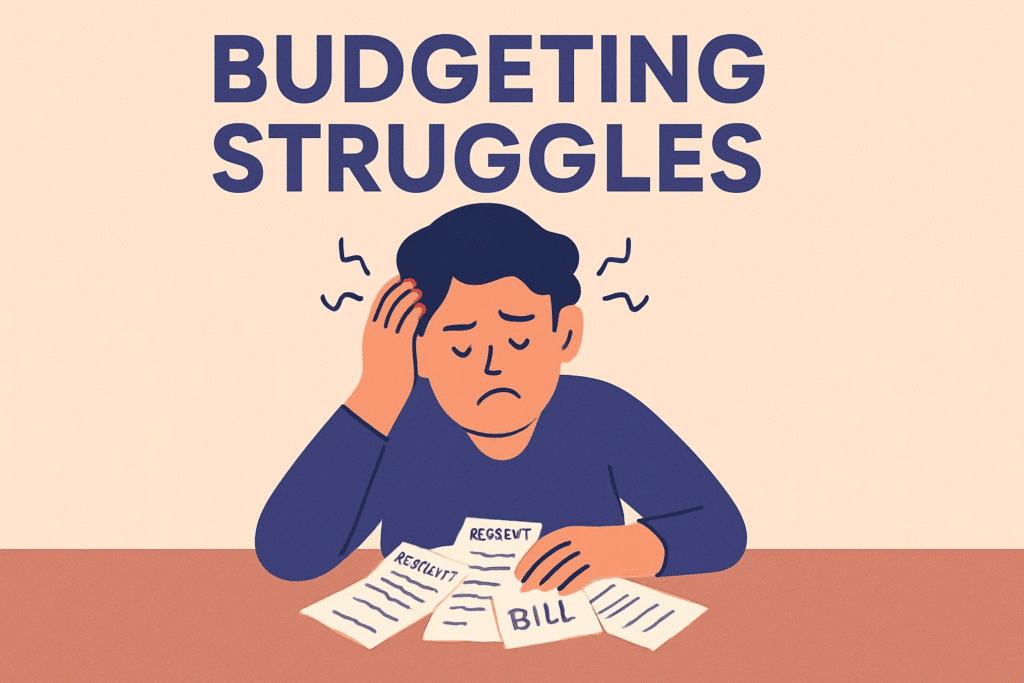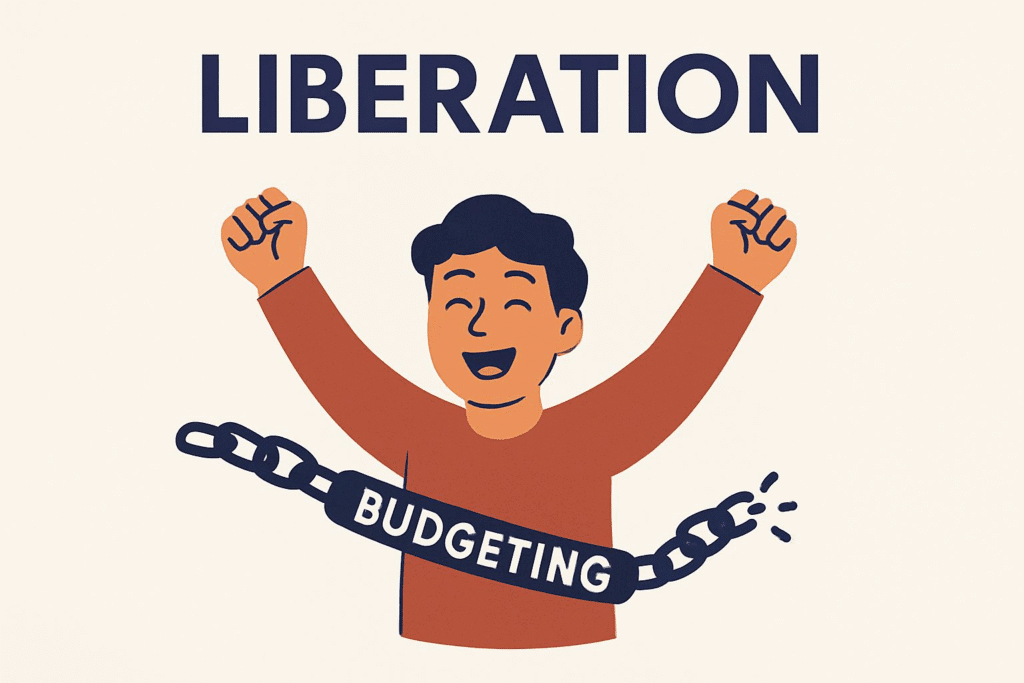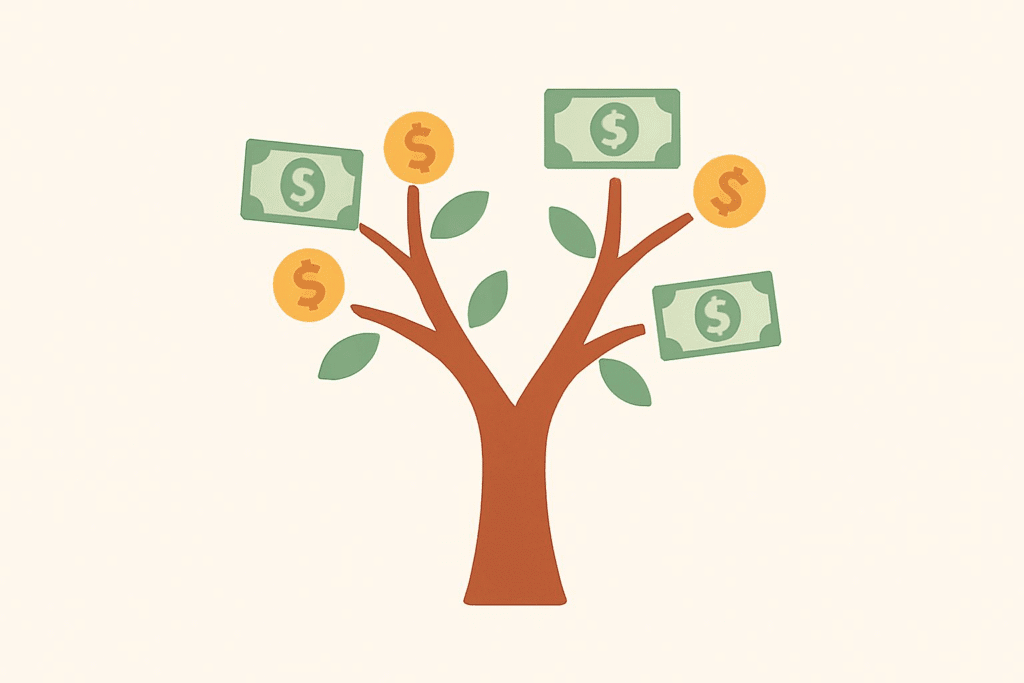Introduction

Why Budgeting Feels Like a Never-Ending Struggle
You’ve likely heard it before: “If you want to get ahead financially, you need a budget.” So, you commit. You track every receipt, scrutinize your bank statements, and cut corners wherever possible. Maybe you stop ordering takeout, cancel a few subscriptions, and try your best to stretch each paycheck just a little further.
And yet—your finances still feel fragile.
Your savings barely move.
A single unexpected expense can derail everything.
And even when you’re doing “everything right,” real financial freedom feels out of reach.
Here’s the hard truth: Budgeting isn’t broken—it’s just not the whole story. And it’s definitely not the strategy most wealthy people rely on.
The Problem with Traditional Budgeting
For years, budgeting has been promoted as the cornerstone of personal finance. It’s taught in classrooms, championed by finance blogs, and baked into nearly every money app out there. Budgeting, we’re told, is the key to control, discipline, and eventual success.
But if that were true, wouldn’t more people already be thriving?
The reality is that traditional budgeting often does the opposite of what it promises. Instead of empowering you, it can trap you in a mindset of scarcity. You end up focusing more on what you can’t afford than on how to grow your income or build wealth. It’s a system designed for survival—not for expansion.
What This Blog Will Uncover
This blog isn’t about abandoning budgeting altogether—but it will challenge the idea that budgeting alone is the path to financial success.
Here’s what you’ll discover:
- Why rigid budgeting fails the average person
- The mindset shift that sets the wealthy apart
- Practical strategies for building wealth without obsessing over every dollar
If you’ve ever felt like budgeting is a treadmill you can’t step off of—this is your signal to explore a better way.
The Budgeting Trap

Why Budgeting Seems Logical—But Rarely Works
On paper, budgeting makes perfect sense. You list your income, track your expenses, cut the fluff, and aim to spend less than you earn. The idea is that if you follow this formula consistently, your bank balance will grow—and financial freedom will eventually follow.
But in practice? That’s rarely how it plays out.
Budgeting assumes money is fixed—that if you can control outflow, the leftover automatically turns into wealth. But real life doesn’t follow that script. Expenses spike unexpectedly. Emergencies arise. Inflation eats at your savings. And your needs and goals evolve as life changes.
Rather than creating momentum, budgeting often feels like quicksand—constant effort with little progress. The result? Many people end up stuck in a loop of cutting, sacrificing, and stressing, without ever truly moving forward financially.
The Hidden Psychological Cost of Budgeting
What most financial advice overlooks is the emotional weight budgeting can carry. When the focus is always on cutting back, it doesn’t just restrict your spending—it starts to shrink your mindset.
Here’s how:
- Scarcity thinking: Constantly telling yourself “I can’t afford this” wires your brain to focus on limits instead of possibilities.
- Guilt and stress: A single impulse purchase can trigger shame, making money feel like a source of anxiety rather than empowerment.
- Reactive behavior: Budgeting often trains people to simply avoid pain, rather than pursue growth. The goal becomes “survive this month,” not “build long-term wealth.”
Plenty of stories exist where people follow all the budgeting “rules”—no takeout, no vacations, no splurges—yet still feel broke, financially fragile, and exhausted. Despite all the discipline, the dream of financial security remains just that—a dream.
Why Cutting Expenses Will Only Take You So Far
Here’s the bottom line: you can’t save your way to wealth.
Yes, budgeting helps avoid waste. But trimming your spending has a ceiling—it can only go so low. Meanwhile, wealth-building has no upper limit.
This is where the wealthy play a fundamentally different game.
They don’t obsess over minor expenses. They don’t spend hours tweaking spreadsheets or skipping every luxury. Instead, they:
- Increase income streams
- Invest in assets
- Build systems that generate cash flow
While traditional budgeting focuses on limiting what you have, real wealth strategies focus on expanding what you create.
How the Rich Play a Different Game

The Fundamental Shift in Mindset
Most people are taught that wealth is achieved by being disciplined—by sticking to a budget, trimming the excess, and keeping a tight grip on spending. The logic is simple: the less you spend, the more you save.
But that’s not how the wealthy operate.
For them, financial growth doesn’t come from restriction. It comes from expansion. Instead of constantly looking for ways to shrink their spending, the rich focus on ways to increase their income, multiply their assets, and scale their wealth.
They don’t obsess over saving a few dollars—they look for opportunities to earn thousands more.
Financial Expansion vs. Financial Restriction
To understand this better, let’s compare two very different money mindsets:
🔻 The Budgeter’s Approach:
- Primary focus: Cut costs
- Strategy: Eliminate unnecessary spending, stretch every dollar, avoid financial “mistakes”
- Outcome: Better control, but limited growth
This approach is reactive—it helps avoid financial damage but rarely creates long-term wealth.
🔺 The Wealth-Builder’s Approach:
- Primary focus: Grow income
- Strategy: Develop high-income skills, invest in scalable assets, focus on leverage
- Outcome: Expanding wealth, increased freedom, financial resilience
The wealthy don’t spend their energy debating whether to buy coffee—they spend it figuring out how to build another income stream.
That core difference in thinking is what separates financial struggle from financial success.
Why the Rich Don’t Stress Over Everyday Expenses
Think about it: Have you ever seen a wealthy person obsessing over the cost of groceries or agonizing over a vacation?
Probably not. And it’s not because they’re careless—it’s because they’ve built systems that allow them to spend without stress.
Here’s what they prioritize instead:
- High-income skills that elevate their earning power
- Investments that generate passive income over time
- Financial leverage—like business systems, real estate, or smart debt—to create long-term growth
The goal isn’t to micromanage every dollar—it’s to build a financial engine that makes budgeting almost irrelevant.
This is why traditional budgeting falls short for most people. It teaches control—but not creation. And until that shift happens, real financial freedom remains out of reach.
Investing vs. Budgeting
Why the Wealthy Prioritize Growth Over Restriction
One of the clearest differences between how everyday people and the wealthy handle money lies in their focus. While most are taught to obsess over cutting costs, the rich concentrate on multiplying their money.
Budgeting is useful for minimizing waste, but it doesn’t create wealth. It helps manage money—but it doesn’t grow it.
The wealthy understand this. They know that lasting financial success isn’t built by squeezing every dollar—it’s built by putting money to work. Their key question isn’t “Where can I spend less?”—it’s “Where can I invest to earn more?”
The Power of Smart Investments
To the wealthy, money isn’t just something to save—it’s a tool for expansion. They strategically allocate their funds into vehicles that produce returns, such as:
- Real estate – Generating passive income and equity through rental properties
- Stock markets – Building wealth through long-term appreciation and dividends
- Businesses – Creating scalable, cash-generating systems
- Education and skills – Investing in themselves to unlock higher income opportunities
The magic of these investments? They continue to work even when they don’t. That’s the core advantage—wealth grows without requiring constant effort. This is what makes traditional budgeting feel unnecessary in the world of financial expansion.
Budgeting Alone Won’t Build Wealth
Picture this:
Two individuals earn the same salary.
- One chooses the path of strict budgeting—saving every extra dollar, avoiding any “unnecessary” expense.
- The other chooses to invest strategically—channeling money into assets that grow.
Fast forward a few years.
The budgeter has saved a respectable amount—but inflation has eaten away some of its value.
The investor, meanwhile, has created income streams, increased their net worth, and built wealth that compounds over time.
Same income. Different mindset. Radically different outcomes.
The takeaway? You can’t cut your way to financial freedom. You have to build your way there—by shifting focus from restriction to growth.
The Power of Cash Flow

Understanding Income Streams vs. Fixed Salaries
Most people earn through a single source: a paycheck. Their entire financial strategy revolves around this fixed income—budgeting carefully, trying to save what’s left, and hoping it’s enough.
But this model has serious limitations:
- Limited flexibility – When expenses rise, income stays the same.
- Slow scalability – Raises are small and infrequent. Promotions take time.
- High vulnerability – If the job disappears, so does the income—and often the stability that comes with it.
The wealthy see this system for what it is: fragile.
That’s why they don’t rely on a single salary. Instead, they focus on cash flow—multiple income streams that ensure money keeps coming in, regardless of where or how they spend their time.
How Passive Income Changes the Game
Passive income is money earned with little to no active effort. It flows in whether you’re at work, on vacation, or asleep. And for the wealthy, it’s the foundation of financial freedom.
Here are some common sources of passive income:
- Rental properties that generate steady monthly cash
- Dividends from stocks and equity investments
- Businesses that run without hands-on management
- Royalties or digital products that continue to sell long after creation
Once income becomes passive, the rules of money change. You’re no longer trading time for dollars—you’re building systems that generate revenue on their own.
This shift transforms how financial decisions are made. Instead of stressing over every expense or budgeting down to the penny, the focus moves to creating and growing assets. That’s why, for people who understand cash flow, traditional budgeting becomes almost irrelevant.
They don’t ask, “What can I cut?”
They ask, “What can I build that pays me again and again?”
Breaking Free from Budgeting
Moving Beyond Restriction Toward Wealth Creation
By now, the message is clear: budgeting alone won’t build wealth. While it can help manage spending, it rarely creates the kind of financial freedom most people are chasing. The real path forward? Shifting from restriction to creation—from managing what you have to building more of it.
So how do you break free from the budgeting trap and step into a wealth-building mindset?
Step 1: Focus on Increasing Income
Instead of asking, “Where can I cut back?” start asking, “How can I earn more?”
This single mindset shift changes everything. When your income grows, so does your flexibility—and the need for rigid budgeting starts to fade.
Here’s how to accelerate your income:
- Develop high-income skills – Focus on skills that command higher pay (e.g., tech, sales, marketing, consulting).
- Pursue bigger opportunities – Don’t wait for a 3% raise. Aim for promotions, job switches, or entrepreneurial leaps.
- Launch side hustles or freelance gigs – Diversify your income so you’re not relying on just one paycheck.
More income equals more options. That’s the first step out of the scarcity cycle.
Step 2: Invest in Assets That Build Wealth
You don’t build wealth by saving alone—you build it by owning things that grow.
Instead of hoarding cash in a savings account, start putting your money to work in assets that produce returns:
- Real estate – Rental properties can generate consistent, passive income.
- Stocks and ETFs – Market investments can grow exponentially over time.
- Businesses – Whether you run them or invest in them, businesses create scalable cash flow.
The more assets you own, the less dependent you are on active income—and the less you need to micromanage spending.
Step 3: Automate Your Financial System
Wealthy people don’t spend hours every week tracking every transaction. Instead, they build systems that manage money automatically—removing stress and allowing them to focus on growth.
Here’s how to automate for freedom:
- Set up automatic investments – Schedule recurring transfers into stocks, retirement accounts, or real estate crowdfunding.
- Build passive income streams – Create products, properties, or businesses that continue earning in the background.
- Follow a strategic roadmap – Use a long-term plan focused on income and asset growth, not just expense control.
When your finances run on autopilot, budgeting becomes obsolete. You stop reacting to money—and start directing it with purpose.
Final Thought:
Breaking free from budgeting isn’t about being careless—it’s about being strategic. When you shift from managing scarcity to creating abundance, everything changes. You’re not just surviving paycheck to paycheck—you’re building a financial life that works for you, not against you.
The wealthy don’t follow traditional budgeting rules—because they’ve built a different game entirely. And now, so can you.
Conclusion

For decades, personal finance advice has been rooted in the same formula: track every expense, cut back where you can, and stick to a strict budget. While this method can help reduce waste, here’s the hard truth—it doesn’t create wealth.
Budgeting is about control. Wealth is about creation.
The financially successful don’t spend their energy obsessing over every dollar—they focus on building systems that generate more of them. They invest, diversify income streams, and use automation to make money work for them, not the other way around.
What You Can Do Next
If traditional budgeting hasn’t brought you financial peace, it’s time to shift your approach. Real progress begins when you stop focusing only on what to cut—and start focusing on what to build.
Here’s how to begin:
- Invest in your earning power – Learn skills that command higher pay and open new doors.
- Start acquiring assets – Prioritize income-producing investments over stockpiling savings.
- Change your mindset – Focus on opportunity and growth, not restriction and fear.
A Final Thought
Budgeting can still be a useful tool—but it should never be the whole strategy. True financial freedom comes when you stop living reactively and start building intentionally.
The rich don’t win by cutting back. They win by creating more.
Now that you understand the real game, the question is simple:
Are you ready to stop budgeting and start building?
